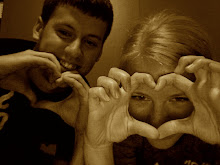In one of my classes, we are currently reading selected essays and short stories by Flannery O'Connor and looking into her stories for theological implications. Let me start off by saying that I like Flannery's stories. I find her engaging and well-spoken and unpredictable. But at the first read-through, I find myself going...
WHAT?!
Maybe this will give you an idea: In Good Men are Hard to Find, (SPOILER ALERT!) the Misfit and his gang shoot and kill an entire family they find stranded on the side of the road after a car accident. That's it. End of story. The grandmother and villain have some snippets of conversation throughout, but the basic plot is that all the good guys die.
Regardless of whether or not you know that Flannery was a very orthodox Catholic, this is not a good ending for a story. There is no satisfying resolution, no triumph of good over evil. There really doesn't even seem to be an ending in the sense that we often expect.
If I were writing the story, the Misfit and his gang would ride off triumphantly (obviously in their black-and-white striped criminal shirts), only to be caught down the road by a wandering police officer. The criminals would be caught and some semblance of justice would be brought to the story.
The only problem is, that isn't how the story goes. And that isn't how Flannery intended it.
The ending is messy. It's unsatisfying. The story is gruesome and distasteful and horrible. That's how life is. Flannery writes this awful story and chops off the marginally happy ending, only to ask us, can you believe in the face of THIS? Can you look at life in this way, in all the horrible, awful details, and still believe? Even if there isn't a happy ending? Even if something goes wrong and life just keeps spinning, oblivious and cold? Even if God does not intervene?
In Christianity, we have a hope that God is going to tie up all of the frayed, loose ends. As Andrew Peterson sings in his song, we know that "all shall be well." Flannery, in a sense, asks us to hold off on that hope for the moment and look at what we've got. She wants to say, yes, we have hope, but we also have pain. Does my faith stand strong in the face of unspeakable horror?
So now the question is: what do you think of Flannery? What does she challenge you to think about?
Subscribe to:
Post Comments (Atom)


After reading this post (SPOILER ALERT!!), I immediately thought of the story of Friday Night Lights. In the end of the book/movie, the football team makes it to the state championship game only to fall short of winning. I can still remember the feeling I had after viewing the final scene.
ReplyDeleteWHAT?! [Yes, I did just copy you.]
Yet I felt as though there must be something more, something just around the bend. Yet nothing came. No plays were challenged or anything. The reality of the situation sinks leaving a bitter taste wherever it goes.
However, as the credits begin to roll, you discover that the team went on the next year to do great things. It's with this final moment of the film that I found myself with a grin on my face and a warmth in my heart. In the words of Andrew Petterson, "all shall be well."